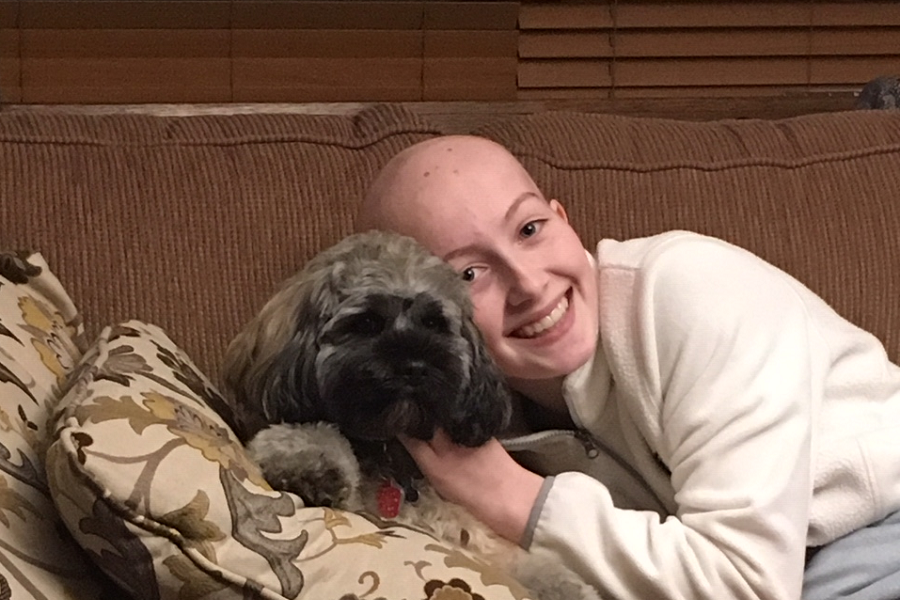When 15-year-old Elizabeth was preparing for her gymnastics competition last December, she was barely thinking about the surgery she had the week before to remove a small tumor. Doctors thought it was benign, and they cleared her to compete over the weekend. She went to gymnastics practice on Friday night before her competition without really worrying, until her parents came to pick her up. They had both come together, which was unusual. When Elizabeth got in the car, they told her the news – the preliminary report came back as cancerous.
Elizabeth’s thoughts raced. She knew right away that the upcoming gymnastics meet would likely be her last, but wrapping her brain around being a teen with cancer was not easy.
“I remember asking my parents if that meant I actually had cancer,” she said. “It was weird to think about it that way because they had already removed the tumor.”
Not long after, Elizabeth was officially diagnosed with Ewing sarcoma, a type of cancer that forms in bone or soft tissue. From that point, things moved quickly – Elizabeth had to have another surgery, as the original one didn’t have wide enough margins for removing this kind of tumor. She had her port placed that same day and began chemotherapy immediately.
Her grueling treatment plan, 14 rounds of chemotherapy with either two or three types of chemo medicine each time, made it hard for her to do the thigs she loves. Her many inpatient hospital stays meant she couldn’t see her dog – her dad would send her pictures of him almost daily. She missed a season of skiing with her friends, and she worked hard to keep up with her schoolwork while in the hospital. But what bothered her even more was seeing the other people around her going through the same kind of treatment.
“I’ve been so lucky, and there are a lot of people way sicker than me. But it was scary to watch other patients being treated for Ewing sarcoma, and it was hard to see them and know that could be a possibility for me. I saw people who chemo didn’t work for them – it was hard to digest that. I’ve learned that you can’t really live with the attitude of, ‘That isn’t going to happen to me.’”
Elizabeth, like most people who aren’t in the cancer world, had never heard of Ewing sarcoma before she was diagnosed. Now she knows plenty – she knows that the treatments she’s receiving are decades old, and she knows that childhood cancer research barely receives any government funding. The one that sticks in her mind most: if she relapses, there is no set treatment protocol.
“Because funding is so low, there’s no protocol for relapsing with my type of cancer. If there was more funding, they could find treatments that reduce relapse or find treatment that works if it happens,” Elizabeth said. “I think it’s so important to fund childhood cancers, because kids have their whole lives ahead of them. There should be way more emphasis on research for kids than what we have now.”
During treatment, Elizabeth has been taking one day at a time, but she has big plans for her future. Her goal is to go to college and possibly become a physical therapist. She remembers how helpful her physical therapist was a few years ago when she broke her ankle in gymnastics, and she thinks it could be a great way for her to help others through tough times.
“I know another patient who had an invasive leg surgery and physical therapy really helped him recover,” Elizabeth said. “It really helps improve your lifestyle after a big change – I think I could be good at that.”
Today, Elizabeth has finished up chemo and is now waiting for her first round of post-treatment scans. The uncertainty of her future makes her anxious, but she does her best to focus on the present by doing little things to make best use of her free time – she is trying to cut down on screen time, and she doesn’t complain about little things anymore. When she looks back on everything she’s experienced, she remembers the moments when people rose to the occasion to support her and her family. Friends from church set up a 6-month meal train when she was diagnosed and showered her in Uber Eats gift cards so she didn’t have to always eat hospital food. One that stands out most is when a friend of hers knew just how to give her both comfort and space.
“I was diagnosed around Christmas time, and not long after I was volunteering at a food pantry with my family. My mom had texted my friend’s mom about my diagnosis, and my friend texted me and just said ‘I’m thinking about you – we don’t have to talk about it unless you want to, we can just have fun tonight.’ That day, that text was exactly what I needed.”
Support Research for Kids Like Elizabeth
For kids who have been treated for cancer, a fear always lingers that the disease will return. Your support helps researchers find better treatments and cures that drive cancer out for good.


